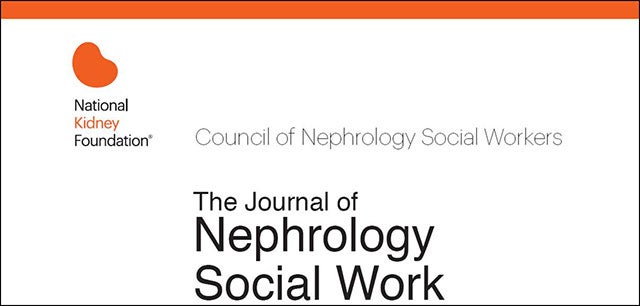The Journal Of Nephrology Social Work - Volume 42, Issue 1 (2018)

Table of Contents
Sociographic Profile of Hemodialysis Patients in Portugal
Marta Freitas Olim, MSW, Social Work Department and Social Responsibility Office of Diaverum, Portugal; Sónia Guadalupe, PhD, Instituto Superior Miguel Torga (ISMT), Centre for Health Studies and Research of the University of Coimbra, Portugal; Francisca Mota, Paula Fragoso, Susana Ribeiro, BASW, Social Work Department of Diaverum, Portugal.
The study outlines the sociographic profile of patients on hemodialysis treatment in Portugal through a descriptive study of 3114 chronic renal failure patients. The dominant sociographic profile indicates that participants were male (59%), over the age of 65 (52.54%, M = 67.6), married (58.70%), with a low educational level (1st to 4th grade: 53.18%), and retired (77.62%). They were born in Portugal (89.56%), living in Lisbon (51.48%), living with nuclear families with children (46.47%) and had informal support networks (72.22%). Other social indicators point to vulnerable situations: 8.6% were unemployed, 2.5% were living in a precarious housing situation; 10.45% were displaced patients; 11.37% lived alone; 9.18% had single-parent families; and 10.69% did not have any source of support. Knowledge of sociographic profiles is a determinant of successful social work and social epidemiology in order to develop social and multidisciplinary intervention programs and social policies that promote individual and social well-being of chronic kidney disease patients.
Journal of Nephrology Social Work. 42(1):9-20. © 2018 National Kidney Foundation, Inc. This is an open access article under the CC BY-NC-ND license http://creativecommons.org/licenses/by-nc-nd/4.0/.
Psychometric Evaluation of the Kidney Disease Quality of Life 36-Item Survey Instrument (KDQOL-36): A Comparison Between Older and Younger Adults Receiving Dialysis
Rasheeda K. Hall MD, MBA, MHSc, Durham VA Geriatric Research, Education and Clinical Center and Duke University Medical Center, Division of Nephrology; Alison Luciano, PhD, Carl Pieper DPH, Duke University Center for the Study of Aging and Human Development; Cathleen S. Colon-Emeric MD, MHSc, Durham VA Geriatric Research, Education and Clinical Center, Duke University Center for the Study of Aging and Human Development, and Duke University Medical Center, Division of Geriatrics
Medicare requires that dialysis units assess quality of life in all patients annually using the Kidney Disease Quality of Life 36-item survey instrument (KDQOL-36). However, whether the KDQOL-36 is a valid instrument for older adults receiving dialysis is not known. The objective of this study was to evaluate the reliability and validity of the KDQOL-36 in both older and younger patients receiving dialysis. We used KDQOL-36 item responses from a nationally representative sample of 3500 older (≥ 75 years) and 500 younger (ages 21 to 74 years) patients receiving dialysis in 2012. We assessed subscale means, ceiling/floor effects, internal consistency reliability, and construct validity. Results demonstrated that the KDQOL-36 has comparable reliability and validity in older and younger adults receiving dialysis.
Journal of Nephrology Social Work. 42(1):21-30. © 2018 National Kidney Foundation, Inc. This is an open access article under the CC BY-NC-ND license http://creativecommons.org/licenses/by-nc-nd/4.0/.
Nephrology Social Workers' Caseloads and Hourly Wages in 2014 and 2017: Findings from the National Kidney Foundation Council of Nephrology Social Workers Professional Practice Survey
Joseph R. Merighi, PhD, MSW, LISW, University of Minnesota, Saint Paul, MN; Mingyang Zheng, MSW, University of Minnesota, Saint Paul, MN; Teri Browne, PhD, MSW, NSW-C, University of South Carolina, Columbia, SC
In 2014 and 2017, the National Kidney Foundation Council of Nephrology Social Workers (NKF-CNSW) conducted online surveys of nephrology social workers employed in outpatient dialysis settings and transplant programs to assess caseload and salary trends at the state, national, and End-Stage Renal Disease Network levels. Between 2014 and 2017, the mean caseloads for outpatient dialysis social workers remained steady at 75 for those employed 20–31 hrs/wk, increased from 113.2 to 126.9 (up 12.1%) for those employed 32–40 hrs/wk, and increased from 116.1 to 129.5 (up 11.5%) for those employed 40 hrs/wk. Median caseloads showed a similar pattern between 2014 and 2017 for those employed 32–40 hrs/wk (110.0 to 120.0; up 9.1%) and for those employed 40 hrs/week (117.0 to 120.0; up 2.6%). Increases in mean hourly wage between 2014 and 2017 were also reported across all three employment status groups: $29.45 to $31.31 per hour (up 6.3%) for those working 20–31 hrs/wk, $28.23 to $30.62 per hour (up 8.5%) for those working 32–40 hrs/wk, and $28.21 to $30.48 per hour (up 8.0%) for dialysis social workers employed 40 hrs/wk.
Annual pre-transplant evaluations of potential donors increased between 2014 and 2017 for transplant social workers who were employed full time (32–40 hrs/wk) and those who worked 40 hrs/wk. Specifically, the mean number of potential donor evaluations increased from 22.1 to 33.8 (up 52.9%) for those employed 32–40 hrs/wk and 23.0 to 33.8 (up 46.9%) for those employed 40 hrs/wk. Pre-transplant evaluations of potential recipients decreased for those employed full-time (283.7 to 219.2, down 22.7%) and for those employed 40 hrs/wk (315.6 to 219.2, down 30.5%). Mean hourly wage data showed an increase for transplant social workers employed full time ($30.74 to $31.50, up 2.5%) and for those employed 40 hrs/wk ($28.74 to $31.03, up 7.9%). In general, increases in social work caseloads and increases in hourly wages were found on a national level; however, variability in mean caseloads and mean hourly wages across ESRD Networks and states persists .
Journal of Nephrology Social Work. 42(1):31-59. © 2017 National Kidney Foundation, Inc. This is an open access article under the CC BY-NC-ND license http://creativecommons.org/licenses/by-nc-nd/4.0/.
National Kidney Foundation 2018 Spring Clinical Meetings Abstracts